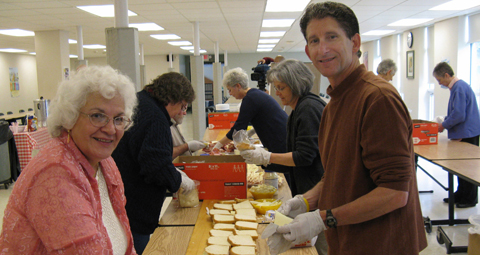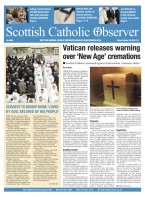October 28 | ![]() 0 COMMENTS
0 COMMENTS ![]() print
print

Share a meal and share your beliefs
— ROSS AHLFELD believes that we all could learn from his granny’s practical approach to ecumenism
SOMEONE once likened ecumenism to arriving at a party where you don’t really know anyone and then awkwardly standing around grinning politely at each other with a drink in your hand.
I think this is why I always admired my granny Agnes Ahlfeld’s approach to ecumenism.
As far back as the 1980s every morning after weekday Mass, the ladies from the local Church of Scotland parish would come to our church hall where Gran and her friends would serve tea and rolls.
Then, on the following week, the favour would be returned and my Gran and her pals would go to the Kirk hall as guests for tea and rolls.
I don’t recall there ever being much theological discussion around the nature of Christ’s true presence in the Eucharist or predestination.
Instead, the idea seemed quite simple: “We’ll be the Catholics, you be the Presbyterians and that’s fine.”
However, that’s not to belittle any of the important ecumenical work that was happening here.
Rather than being talking shop intellectuals, as we tend to be today, these fine women were building deep friendships and forging real relationships between faith communities at a grassroots level through real activity, long before such initiatives were popular.
All the while, they were raising funds for missionary work and other good causes. This is why I am a great believer in the practical ecumenism of doing something together, particularly the act of sharing a meal.
Even so, I would have to say that I’ve drawn most of my ideas on ecumenism from the influence of my grandfather Robey Ahlfeld, who was somewhat similar to Erasmus of Rotterdam in the sense that he was a devout Catholic in the heart and the soul but solidly Presbyterian in the head.
This is because my grandfather was raised in the Church of Scotland, converted to Catholicism, worked as shipwright all his life, was a teetotaller, wore a shirt and tie around the house and went to Mass every day in his retirement.
Today, I strongly associate my grandfather with that sturdy Calvinist self-discipline which, at its best, once had the ability to empower Scottish working class Protestants with a deep sense of dignity, self respect and virtue.
And so, in later years when I began to explore some of the major Christian writers from the reformed tradition such as Karl Barth, Dietrich Bonhoeffer and Jürgen Moltmann, it was with an appreciation that they too are part of my own heritage.
Perhaps this is the critical point where I sense the underlying influence of both my grandparents’ approach to ecumenism; when we are exposed to such ideas from out with our own tradition, we can find a great deal of common ground without embracing teachings which are contrary to the Catechism of our Catholic faith.
This is provided we always approach them being already informed by our own identity as Catholics. Sure, by all means let us explore the works of the noteworthy Protestant writers but read them firmly as a Catholic in the spirit of kindness, charity and reconciliation and you won’t go wrong.
That being said, for many, the best example of a space where nobody had to really surrender anything of themselves to find unity was Pope Benedict’s bold 2009 Anglicanorum Coetibus which allowed Anglicans to enter into the full communion of the Catholic Church whilst retaining much of their heritage and traditions.
I’m not too sure how successful this initiative was, per chance one day the eminent Canon Lawyers and illustrious academics of the Church might conceivably perform the theological gymnastics required to permit the creation of an Ordinariate accommodating our Presbyterian brothers and sisters? After all, we still have Charismatic Renewal, right?
In the meantime, we must continue to foster good relationships and for me the most authentic exemplification of unity still remains the ecumenical monastic community of Taizé in Northern France with its strong devotion to peace and justice through prayer and meditation.
I recently spent a few weeks attending regular worship with a Taizé community of young German and French students, both Catholic and Protestant.
In Europe these joyful evenings of hymns, prayers and silence take on real meaning and significance for these young people, especially since Taizé was created by Brother Roger’s desire for peace and reconciliation. Not just reconciliation between Catholics and Protestants, but also reconciliation between the people of Europe too.
Nonetheless, ecumenism can be a tricky subject, especially for those of us involved in our parish RCIA groups as catechists.
For example, we always want our Catechumens to feel that they don’t need to abandon every aspect of their previous faith or Christian denomination.
On the other hand, what’s the point of a candidate giving up one or two nights per week for months of instruction only for a bunch of us RCIA folks to give them some vague, wishy-washy message about how there’s not really much difference and you can believe what you like? That’s not why people enter the Church.
For me, some of these challenges are overcome by taking guidance on Spiritual formation from people like Henri Nouwen.
For example, when joining a Church, candidates too often think that they must become perfect and be almost sinless before entering into full communion. When providing support to an individual I would stress early on that we are all already beloved and that God sees us as loved, accepted and worthy of salvation already.
That we are all the beloved sons and daughters of God is the most important message Henri Nouwen has for us all. This is the perfect way to invite any person on the path towards God and the Christian life. This more open period of discernment for the candidate will then lead towards right belief further down the road.
As Henri reminds us: “It is important to stand before God truthfully and fully as we are with nothing hidden or with any feelings of shame or guilt.”
Yet, for us all, the most vital work remains in our parishes where the long road to unity starts. Therefore, this month, if you have any visitors from other Churches or inquirers in your parish looking to start the journey towards full communion then please make them feel welcome, make them feel part of the community.
Sometimes we are all guilty of doing Sunday worship together without entering into proper community with each other. Maybe start down in the Church hall with a slice sausage roll like my Gran used to serve.
Indeed, never underestimate the power of the humble slice roll.
The kids and I once gave them up for the duration of Lent, I really struggled that year, but then we all felt much better about the whole thing after our Bishop John Keenan confessed to the boys that he also loves a slice roll with brown sauce and that he too would also find this sacrifice quite difficult. So, if a slice roll is good enough for Bishop John then it’s good enough for us all.











